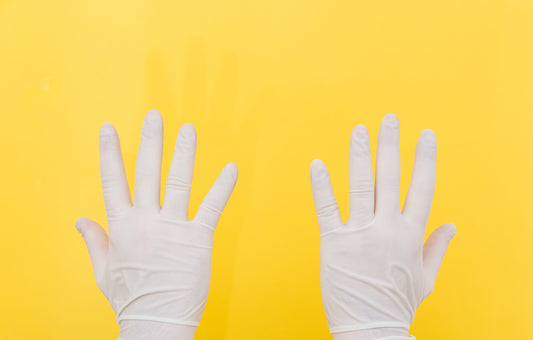3 Important Hazards You Need To Know
The food safety, environmental and occupational risks of vinyl gloves are frequently reported. We explain in more detail why global companies are phasing out the use of PVC, including vinyl (PVC) gloves and switching to safer and healthier PVC-free products.
1. Food Safety Risks
Because of their molecular structure, vinyl gloves are an ineffective barrier protection for food:
- Vinyl gloves can begin leaking as soon as they are donned - the PVC polymer is a rigid and weak structure, and micro-punctures can occur within a few hand movements.
- Scientific studies have proven a 10-fold increase in average failure rate of vinyl gloves compared to nitrile gloves, after simulated use. The average failure rate of vinyl gloves was 51%.
- Due to the increase in failure rate numerous studies have shown vinyl gloves have an increased permeability to bacteria and virus, increasing the risk of cross-contamination for both the glove user and the food they are handling.
- An estimated 50-90% of punctures go unrecognized by glove wearers. Because “glove juice” and sweat build-up is particularly common in vinyl gloves, this results in the contamination of contact surfaces through glove holes, often so small they are unnoticed by the glove wearer.
- Vinyl disposable gloves (over other types) are more frequently responsible for cross-contamination events in food handling where glove type is identified.
Read our case study about a nationwide food market and how they saved money by switching from vinyl to our higher-quality FineTOUGH nitrile glove.
2. Environmental Risks
PVC is described by the U.S. Green Building Council as “consistently among the worst materials for human health impacts.”
- The manufacture and disposal of PVC uses or releases numerous other hazardous chemicals and carcinogens, and can include PFAS, dioxins, chlorine gas, ethylene dichloride, dioxins, mercury and asbestos.
- Up to 50% of vinyl gloves rip on donning, significantly increasing glove usage and therefore waste, compared to better quality gloves.
- Vinyl gloves have a poor resistance to stretch and elongation, and are produced thicker in an attempt to reduce ripping. This leads to a heavier weight of glove, and increased waste disposal.
Read our blog Do Cheap Disposable Gloves Save You Money? to learn why a gloves sticker price doesn't accurately reflect how much money you are actually spending on gloves.
3. Worker & Consumer Issues
Vinyl gloves can also be a health threat for wearers:
- Musculoskeletal Disorders: Vinyl gloves are made from PVC, and are therefore poorly fitting, thick, rigid and inflexible. These factors often cause repetitive fatigue injuries and trauma to the wearer’s fingers and thumbs.
- Skin Issues: The quality of glove ingredients is directly proportional to the likelihood the glove will cause skin irritation for the wearer. Unreliable manufacturers save money by adding cheaper chemicals and ingredients to the glove raw material ‘recipe’. Gloves made with these fillers are more likely to cause skin irritation and can provide a toxic risk to the wearer.
- Phthalates & BPA: Up to 50% of vinyl glove raw materials are made from plasticizers, often containing the inexpensive phthalates such as DiNP or DEHP and can also contain BPA.
- Phthalates have been shown to leach from products into the human body. Exposure to DEHP has been associated with adverse reproductive, neurobehavioral and respiratory outcomes and metabolic diseases such as insulin resistance.
- DiNP and DEHP are on the Proposition 65 list of chemicals known to California to cause cancer.
- BPA is an endocrine disruptor, affecting hormones, and is linked to reproductive disorders, heart disease and cancers.
Eagle Protect does not recommend the use of vinyl gloves. The development of thinner and stronger nitrile gloves are recommended for improved food safety practices, environmental impact and worker safety. For intermittent and shorter use situations, Eagle also offers a line of high-quality polyethylene gloves which provide budget-friendly protection. Interested in learning more about the risks of vinyl gloves? Click below to keep reading.



